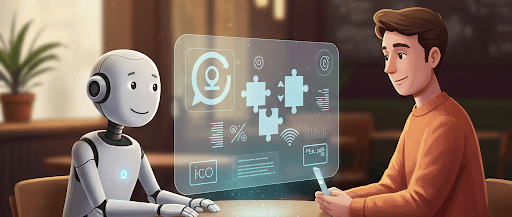Unlocking the Freedom Puzzle
Why Your Tech Choices Matter More Than You Think
Mason Dumas
3/24/20253 min read


Hey, friends! Picture this: we're sitting in a cozy coffee shop, sipping our drinks, eager to dive into a new tech adventure. Today, I want to chat about something that's been simmering beneath the surface of tech—and something many of us feel but rarely articulate clearly: vendor lock-in.
I recently had a fascinating conversation that brought this issue vividly to life. (Huge shoutout to Mason and his fiancé for sparking this idea!) Mason found himself reconsidering the strategies of big-tech heavyweights like Mark Zuckerberg—particularly as they're experimenting with "local source" open initiatives. Initially, it seemed hopeful: Open-source from giants sounds amazing, right? But something didn't sit quite right...
The Trap of Invisible Walls (AKA Vendor Lock-In)
You know that slightly panicked feeling when choosing a tech ecosystem? Whether it's iOS versus Android, Alexa versus Google Home, or even Hue smart bulbs versus another lighting brand—you instinctively know that picking one might mean you're signing away flexibility. You're effectively marrying that vendor—for better or worse—from updates, pricing models, to product line limitations.
Mason put it brilliantly: vendor lock-in is designed into the fabric. It isn't accidental convenience; it's strategic. Big companies want you to stay—not by consistently winning your loyalty—but by subtly limiting your freedom to explore elsewhere.
What Does Real Freedom Look Like?
But here's the exciting part: Mason’s pushing back against this status quo with something he's deeply passionate about—modular, decentralized tech spaces. He envisions providing clear, understandable "brands" of tools just like in the grocery store, where choices aren't overwhelming but distinctly meaningful. The core idea? You never have to pay a heavy price for making one tech choice because changing your mind later should feel intuitive, hassle-free, and empowering.
Imagine your home ecosystem—think servers, laptops, storage, Kubernetes—acting like your favorite cookbook. Each page is a thoughtfully tested recipe, easy and personalized, empowering you to mix, match, switch, and evolve as your tastes change and grow. No more invisible walls. No more feeling locked-in simply because it's inconvenient to switch.
Decentralization in Your Own Backyard
Mason argues passionately that the next great consumer tech leap isn't a shiny new product feature, nor another convenience we didn't know we (didn't) need—but something profoundly simple: true digital choice and agency.
He's not just saying it—he's building it. How, exactly? He's creating a home computing ecosystem that leverages technologies like Kubernetes, Ansible, and Flux (among other powerful tools). On top of that, conversational AI—once just helpers—become conversational collaborators, intuitively guiding and empowering users through choices that matter most.
The end result feels more like a thoughtful, conversational partner than a frustrating user manual. Imagine an AI that doesn't drown you in complexity but gently nudges you into clarity and autonomy. It's like cooking with a friendly chef rather than blindly following step-by-step instructions you don't understand.
Storytelling & Subtle Harm: The Missing Piece
There's a big challenge, though—one Mason highlighted thoughtfully in our conversation: that subtle harm (such as invisible long-term costs of vendor lock-in or data-tracking) is abstract and distant, difficult for users to feel acutely until it's too late. But direct harm? It's immediate, noticeable, and emotionally palpable. How, then, can a subtle vendor risk ever compete meaningfully for our attention?
Mason believes storytelling—and practical, everyday resonant experiences—are absolutely essential. This approach could effectively illuminate otherwise invisible walls. His vision pairs conversational AI with clear experiential scenarios—transforming abstract freedom debates into emotional, relatable experiences everyone deeply understands.
Think about that moment of frustration switching phones and realizing how deeply you're entrenched into Apple's or Google's ecosystem. What if your conversational AI could demonstrate (in a compelling narrative) just how powerful simplicity and modular design can be? What if we could effectively illustrate the immense difference between genuine freedom and subtle dependency?
Your Choices, Your Power
So here’s the takeaway Mason left me energized by: The future isn't about abstract ideology or theoretical debates ("capitalism" versus "communism" versus "big-tech monopolies"). It's about tangible, day-by-day empowerment and intentional technology choices. It's about practical modularity, incremental improvements, genuine interoperability—and ultimately, feeling that you have true agency.
Maybe it’s about less dependence, fewer invisible costs, and more intuitive freedom. Imagine a digital future where changing your tech preferences is as straightforward (and guilt-free) as choosing a different toothpaste brand at the supermarket.
Now, let's keep this conversation going! I'd love to hear your thoughts and experiences:
- Have you ever felt trapped by tech vendor lock-in?
- How comfortable would you feel adopting a home-based modular ecosystem?
- What tangible scenario or experience vividly taught you about the subtle harms of dependency?
Drop your reflections, experiences, or questions below—I'd love to keep exploring this together. After all, true freedom in technology shouldn't be hidden behind invisible walls. Let's start knocking them down together, one intentional choice at a time!
